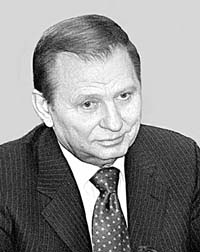Parliament Also Can Elect the President

Answering journalists’ questions on August 26 in Novhorod-Siversky where Ukraine’s president came on a working visit, Leonid Kuchma expressed his preparedness to support the idea of electing president by the parliament “if need be.” The head of state recalled that he is for electing president by the people, which was registered in the presidential draft bill On Amendments to the Constitution. However, in case the political powers “come to a political agreement” on electing the president by the parliament, President Kuchma says he is prepared to second this initiative. He again stressed that in implementing the constitutional reform he is “prepared to take steps to meet the opposition as much as the opposition is ready to do likewise,” adding that “today the issue of constitutional reform is the major question of Ukraine’s political life.”
The president also stated that, regarding state employees who have reached the age limit for the civil service (65), he would be guided by the law. “Today we have proposals and pressure on the president from all sides. Same say, we need it, others, we don’t need [to discharge civil servants aged 65 — Ed.]. My position is, there is a law, and the president is simply bound to observe it,” Leonid Kuchma said. “If the parliament doesn’t like this, let them make amendments, and I’ll sign the law,” he remarked.
Earlier the president stated that he is ready to second the new coordinated bill on making changes to the Constitution, the work on which is, he says, “practically over.” Pres. Kuchma stated this at a grand meeting dedicated to the Independence Day. He did not analyze the contents of the new document, but a few days earlier Petro Symonenko of the Communist Party and Oleksandr Moroz of the Socialist Party informed the mass media that its key thesis is to elect the president by the parliament. “In spite of certain weak spots, I believe the bill should be approved by Verkhovna Rada. It probably already has gained a Constitutional majority,” Interfax Ukraine quotes the president as saying. For him, the determining factor is an agreement reached in the new draft on “the major question, forming a government by a coalition of factions and deputy groups.”
Earlier the president carried out the promise he gave in mid-July, recalling his draft amendments from Verkhovna Rada. In his message to the parliament he said that the reason why he did so was that the way chosen by Verkhovna Rada, sending his draft to the Constitutional Court, “is dubious from a legal viewpoint... It is worth stressing that the draft’s major theses met broad support during its nationwide discussion and were supported also by many people’s deputies, scholars, and practicing lawyers in Ukraine,” the letter reads. “Simultaneously, instead of solving the issues connecting with considering the bill, a substantial number of people’s deputies had in fact blocked it by various incorrect actions, proclaiming far-fetched and groundless versions of its implementation.”
In his speech Pres. Kuchma also mentioned the need for developing Ukraine’s party system, involving legislative mechanisms, and spoke for reconsidering the role of the National Security and Defense Council, in part, in fighting corruption. In the head of state’s view, until recently Ukraine has been “obviously underestimating a powerful potential of this body... Now it would be appropriate to correct the mistake,” he said (recall that since June 25 when Yevhen Marchuk was appointed Minister for Defense the post of NSDC secretary has remained vacant).
Speaking about Ukraine’s foreign policy, a key factor and token of Ukraine’s style and role in the international arena is, in President Kuchma’s view, its peacekeeping mission. Ukraine’s current position in the contemporary world “comes directly from the deep and undoubtedly tectonic changes” after September 11, 2001, he stressed. In his words, a number of subsequent acts of terrorism “made us realize that the evil of terrorism is close to us.” Ukraine’s ability to act effectively in a changing world was duly appreciated by leaders of other countries and foreign experts, he stated: “This is important because in the twelve years of our independence we proved unable to create an effective system of protecting our interests abroad, while the authorities’ ill-wishers have long turned throwing mud on their own country into a quite profitable business.” He also added that the Verkhovna Rada vote on sending peacekeepers to Iraq has proven that the authorities and opposition are able to jointly take “decisions that are far from simple but necessary for the country.”






